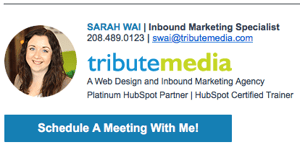How to Work Remotely Successfully and Efficiently
Posted by Sarah Wai on Mar 6, 2020 10:53:00 AM

When I started working remotely a few years ago, I thought I had a good idea of what I was getting myself into- but man, was it a shock. Many professionals who have made this switch cold-turkey like I did understand what I’m talking about. Going from face-to-face interactions and working in a cubicle daily, to suddenly having the freedom to work from anywhere, without your coworkers in your immediate circle, is a shock, among so many other changes you experience.
I’ve learned a lot in my time as a remote professional and have learned to set myself up for success. If you are new to remote work, are considering it, or you’ve been doing it for a while but don’t feel your rhythm is sufficient, this blog is for you. I want to impart the things I’ve learned along the way to help you set yourself up for success.
Find Your Remote Work Rhythm
When I transitioned to remote work, the first thing I knew I was lacking was a rhythm- a daily routine. So I tried doing what I had always done when I worked in the office- Wake up to an alarm set for 6:30 am, make coffee, have quiet time while drinking said coffee, get ready, grab some breakfast to-go and “hit the road.” This didn’t go quite as planned, because I realized that when I don’t have somewhere to be I am less inclined to get myself moving. The snooze button and I were well acquainted.
Don't Be Afraid of a Little Trial and Error
Through trial and error, I finally found my rhythm. To set myself up for success, I had to first be honest with myself about my strengths and weaknesses when it came to working remotely (This is pro-tip #1).
Honestly, I hate waking up at 6:30 am. I used to be a morning person. Now, I’m not. I’m a late afternoon/early evening person. So I let myself sleep a little longer. It pains me even to admit that, as I know many people will judge me for it. But that’s what my body needs. I sleep roughly 9 hours every night, and it’s one of the best decisions I made for myself.
There are so many articles floating around that say the most successful people wake up at 5 am and get "A", "B", and "C" done before work. If that’s what works for them- kudos. I’m not that person, and I’ve learned to live with that. My success looks like getting at least 8 hours of sleep a night. (Pro-tip #2) Find what works for you, caters to your body’s needs, and helps you start a rhythm you can maintain.
Restructure Your Day, but Allow for Flexibility
Once I established a good routine, I needed to move other things around. I start my workday at 9 am, so I needed to make sure I could fit the things I needed to in the hour between waking and working. Being honest, again, I am a slow mover in the morning and don’t do well during the day if my morning was rushed. To accommodate my preferences, I no longer try to fit getting ready, coffee, quiet time (something I value too much to rush, so I moved to my evenings), and breakfast all before I start work.
Instead, I wake up to my alarm, start my coffee pot, and get ready.
(I know this all seems like a lot of detail, but the details make all the difference.)
After I have gotten ready for the day (pro-tip #3: dress like you are going to work every single day), I grab a cup of coffee and set to work on my laptop in my home office. (Pro-tip #4) If you don’t have a home office, make yourself one (whether it be a little nook in your house or a room you’ve dedicated as your office), because this is essential to separating work-life from home-life when they are physically the same.
After about an hour or two of work (mornings and evenings are when I tend to be more creative), I grab myself some breakfast and allow myself a brain break by having breakfast away from my computer if possible. Then I work again until lunch.
(Pro-tip #5) Afternoons are when I recommend trying to schedule most meetings because it’s when our brains are most apt to wander, and it is a good refresh to have some social interaction when your mind has reached that point. Meetings will use a different part of your brain than your every day tasks because it involves human interaction.
If I’ve had a productive day, I’ll allow myself to stop work around 5 or so. If I find I’m just not in the right headspace during the afternoon to get much done, I’ll watch/listen to podcasts or educational videos while painting a paint-by-number (pro-tip #6: if you are a creative that needs stimulation during the day, I highly recommend adult paint-by-numbers or an equivalent to help you get those creative juices flowing or out of your system on slow days). I’ll then return to work after giving myself that refresh time, usually with more pep in my step and brain juices flowing. Some of my best work comes after taking those breaks and returning to work in the evenings.
No matter what, every day, I physically close my office door (even if I worked outside my office) to mentally shut off my work brain. I know that may sound strange, but for me, it's necessary and it's what works. Even if I am using my laptop outside of my office after-hours for other things (like grad school), I can mentally disassociate from work because I’ve “told” my brain that work is over for the day.
What works for me may not work for you, which is why it’s so important that you find your own rhythm!
Organizing Your Tasks and Work Days
Just as you need a rhythm for your day as a whole, you have to find your rhythm for scheduling meetings, projects, and tasks. Here are a few things I use to keep myself organized:
1) A physical planner (personal preference) that lists all of my tasks for the week with priority level.
2) Google Calendar combined with HubSpot’s Meeting Scheduling Software Integration: While I can easily organize internal meetings and block my time on my Google calendar for miscellaneous things, I love that I can tell clients to “schedule a meeting with me by clicking to do so in my email signature."

This eliminates back and forth emails between clients, they can see what times I am available, and they can choose a time that works best for their schedule. Once they reserve a time with me, I’m notified by email, and it’s automatically added to my Google calendar. This has proven to be a great way to handle scheduling with minimal communication and maximum efficiency.
Again, allow yourself some flexibility. You are not going to be productive ALL day, and some days are more difficult than others. Figure out what works for you.Are You Setting Yourself Up for Success?
This is the most important question you could ever ask yourself if you are a remote worker. Be honest with yourself and, as much as possible, listen and respond to what your body, mind, and soul need every moment of every day. This is the best way to set yourself up for maximum productivity, efficiency, and health while working remotely.
Oh, and make sure you get some exercise during the day. That really helps with productivity!
Written by Sarah Wai
Former Content, Email, and Social Media Marketing Specialist of Tribute Media. Bachelor of Science in Digital Communication Arts and Master in Business Administration.

